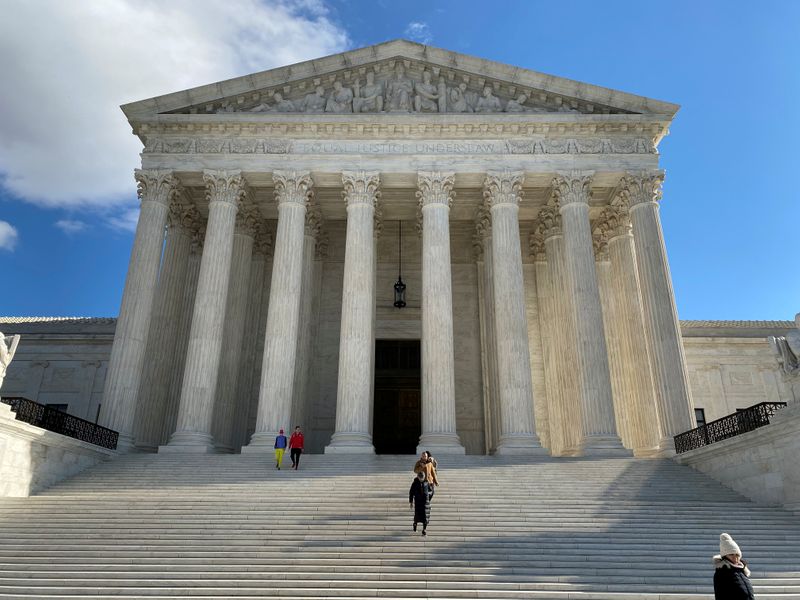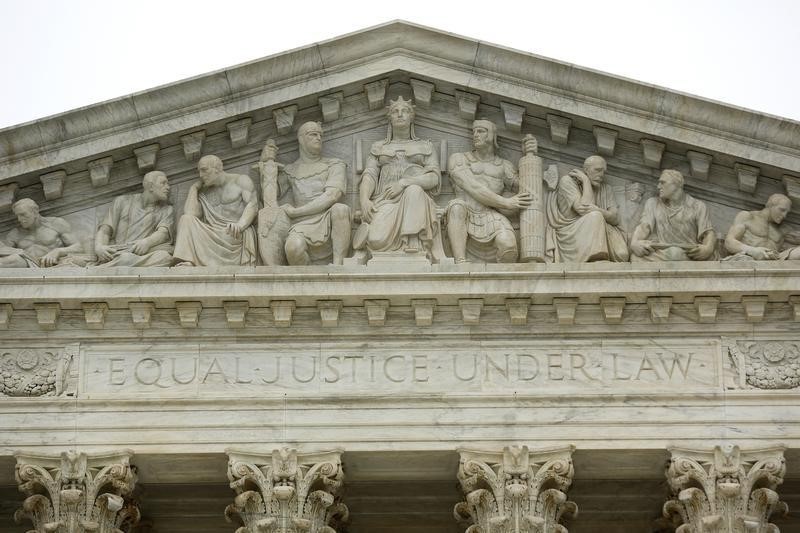By Lawrence Hurley and Andrew Chung
WASHINGTON (Reuters) - The U.S. Supreme Court on Monday declined to hear eight cases involving a legal defense called qualified immunity that can be used to shield government officials from lawsuits, including seven involving police accused of excessive force or other misconduct.
In six of the seven cases involving police, plaintiffs who sued officers were challenging actions in lower courts that protected the defendants through qualified immunity. The other one involved two officers who argued they deserve such protection but lost in a lower court.
Among the cases the justices declined to hear was a dispute over whether officers in Tennessee can be sued for using a police dog that bit a man who has said he had put up his hands in surrender. Justice Clarence Thomas, a skeptic of qualified immunity, said in a dissent that the court should have heard that case.
The court could still take up other qualified immunity cases.
The issue of police use of force has been in the spotlight since a black man named George Floyd died after a Minneapolis police officer knelt on his neck for nearly nine minutes while detaining him on May 25. Floyd's killing sparked protests in U.S. cities demanding police reform, with some demonstrators calling for eliminating qualified immunity for law enforcement officers.
Democratic and Republican lawmakers in Washington have been pulling together their own versions of police reform legislation. A Democratic plan unveiled in the House would roll back qualified immunity for law enforcement officers.
Several Democratic members of the House of Representatives Judiciary Committee, which heard testimony last week on police practices, denounced the court's rejection of the cases.
"The Supreme Court's failure to reconsider this flawed legal rule makes it all the more important for Congress to act," Chairman Jerrold Nadler and two other committee members said in a statement.
Some Republican lawmakers have come out against abolishing qualified immunity, and the White House has signaled its opposition.
The Supreme Court recognized qualified immunity 50 years ago to protect government officials from frivolous lawsuits. Police have said the doctrine ensures they can make split-second decisions in dangerous situations without worrying about being sued later. Critics have said the doctrine too often lets police brutality go unpunished.
Reuters published an investigation on May 8 that showed how qualified immunity, with the Supreme Court's continual refinements, has made it easier for police to kill or injure civilians with impunity.
[For full coverage see: https://www.reuters.com/investigates/special-report/usa-police-immunity-scotus/]
The investigation found that based on Supreme Court guidance, police often escape liability even when a lower court determines officers used excessive force in violation of U.S. Constitution's the Fourth Amendment, so long as their specific conduct has not been "clearly established" in earlier cases as unconstitutional.
In the Tennessee case, a homeless man named Alexander Baxter (NYSE:BAX) arrested during a 2014 home break-in in Nashville challenged a lower court's ruling granting immunity to two officers who used a police dog on him.
Baxter said he had already put up his hands in surrender when the dog bit him, resulting in an injury to his arm that required hospital treatment. The officers, Brad Bracey and Spencer Harris, said Baxter had not responded to warnings and that they did not see his hands raised.
Baxter sued the officers in federal court, accusing them of using excessive force. The 6th U.S. Circuit Court of Appeals in Cincinnati, Ohio, granted the officers qualified immunity.
Two cases turned away on Monday involved law enforcement officers sued over alleged misconduct not involving excessive force and one case involved Texas Medical Board investigators who relied upon qualified immunity in a lawsuit.

